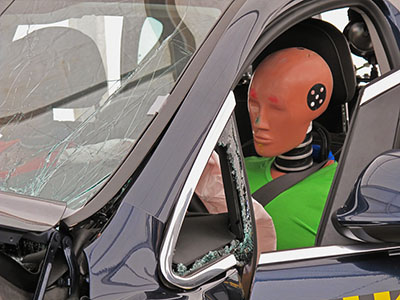Safety-Conscious Car Buyers Now Have 90 Top-Rated Vehicles to Choose From
Last updated March 1, 2021
Whether it’s an SUV for you, or a compact car for the teenage driver in the house, you want any new vehicle you buy to be as safe as possible. You now have more choices than ever.
A record number of 2021 models earned a Top Safety Pick award from the Insurance Institute for Highway Safety (IIHS): 90 made the list compared with 64 last year.
Based on IIHS tests, these 90 vehicles provide good protection to passengers in a crash, have headlights that sufficiently light the road ahead with less glare for oncoming drivers, and have effective front crash protection technology.
“We’ve really seen an improvement when it comes to headlights and front crash protection, such as automatic emergency breaking,” IIHS President David Harkey told Checkbook. “We’re glad to have minivans, the Honda Odyssey and Toyota Sienna, and a pickup, the Ram 1500 crew cab, back on the list.”
Look at the list of award winners and you’ll see that you don’t always have to buy the highest trim level to get a vehicle that performs well in IIHS crash tests and comes with important safety technology.
 Two Award Categories
Two Award Categories
The IIHS has two safety awards: Top Safety Pick and Top Safety Pick+. Both awards require “good” ratings in all six IIHS crashworthiness tests; a front crash prevention system that earns a “superior” or “advanced” rating in both vehicle-to-vehicle and vehicle-to-pedestrian evaluations; and headlights rated “good” or “acceptable.”
Models that have good or acceptable headlights across all trim levels and packages receive the “plus” designation. This makes shopping easier for safety-conscious consumers by eliminating the guesswork when comparing various versions of the same vehicle. The styling may vary, but they all have the same headlights.
This year, 49 of the 90 vehicles achieving award status were in the Top Safety Pick+ category, more than double the number from last year.
Note: Vehicles are not required to have front crash prevention as standard equipment to qualify for either award, only as an option. Harkey said manufacturers are voluntarily moving in the right direction; 22 have pledged to equip at least 95 percent of their models with vehicle-to-vehicle automatic emergency braking beginning in the 2022-23 production year.
“It is nice to see more and more manufacturers realize that advanced crash avoidance technology should be seen as standard equipment, and not part of luxury add-on packages,” said Jason Levine, executive director of the non-profit Center for Auto Safety. “That said, there’s a long way to go to get the right safety technology—from automatic emergency braking to smart headlights—on all new vehicles, and we think the federal government should be taking a more active role to ensure that this happens.”
Pushing Automakers to Do the Right Thing
The IIHS ratings show that a few manufacturers excel at making safer vehicles. The Hyundai Motor Group (including the Hyundai, Kia and Genesis brands) has the most awards (17), while Volvo has the most Top Safety Pick+ awards (9).
General Motors, on the other hand, only earned two awards (one Top Safety Pick and one Top Safety Pick+) which the IIHS news release calls "striking for such a large manufacturer.”
Mitsubishi is the only major manufacturer that failed to earn a single IIHS safety award.
Consumer advocates credit the IIHS, a non-profit organization funded by the insurance industry, for pushing manufacturers to make safer vehicles with its independent crash tests that are significantly tougher than the ones done by the federal government.
“By widely publicizing models that do well in their crash tests and naming those that do poorly, the IIHS test results enable consumers to vote for safer cars with their dollars, forcing carmakers to respond by building safer cars and install safety technology before it’s required by federal regulation,” said Jack Gillis, executive director of the Consumer Federation of America and author of The Car Book. “As are the government crash tests, the IIHS testing program is a powerful example of what I call regulation by information.”
The IIHS hasn’t changed its testing criteria for a few years, in order to give the industry time to make design changes that enable their vehicles to pass the current crash tests. That may soon change. Harkey told Checkbook he expects his organization’s tests will get tougher in the next couple of years.
“That's one of the ways that we continue to push the auto industry forward,” he said.
More Info:
Contributing editor Herb Weisbaum (“The ConsumerMan”) is an Emmy award-winning broadcaster and one of America's top consumer experts. He is also the consumer reporter for KOMO radio in Seattle. You can also find him on Facebook, Twitter, and at ConsumerMan.com.


